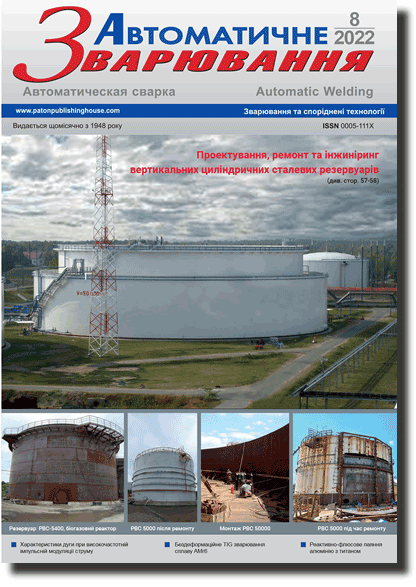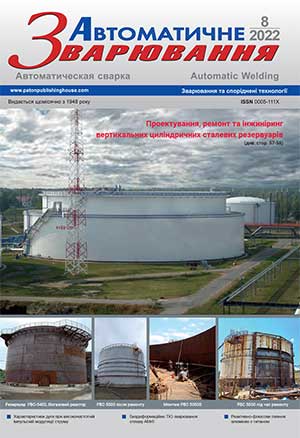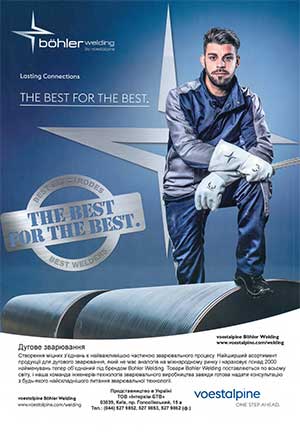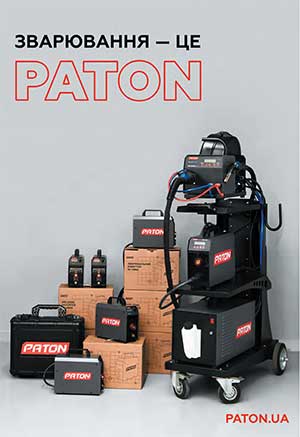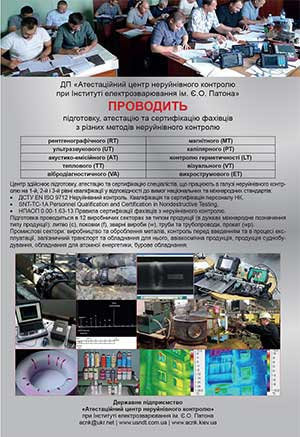| 2022 №08 (06) |
DOI of Article 10.37434/as2022.08.07 |
2022 №08 (01) |
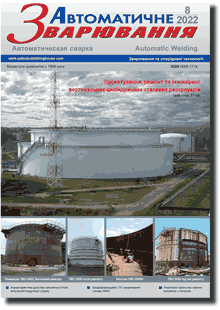
"Avtomatychne Zvaryuvannya" (Automatic Welding), #8, 2022, pp. 48-54
Reactive-flux brazing of aluminium to titanium
O.M. Sabadash, S.V. Maksymova
E.O. Paton Electric Welding Institute of the NAS of Ukraine. 11 Kazymyr Malevych Str., 03150, Kyiv, Ukraine. E-mail: office@paton.kiev.ua
metal in argon application of reactive flux of KAlF4–10K2SiF6 system with additives of CoF2, K2ZrF6 compounds, promotes production of a sound joint due to formation of a low-melting alloy of Al-Si system on the contact surface. The low-melting alloy of Al-Si system newly-formed at reactive-flux brazing can independently fulfill the function of brazing filler metal at formation of a dissimilar metal joint. Cobalt reduced from the flux has little influence on weld structure and joint strength. At application of Al–12Si brazing filler metal and reactive flux of KAlF4–10K2SiF6–5K2ZrF6 system, which contains potassium-zirconium fluoride (K2ZrF6), a certain refinement of the structure (dendrites of aluminium-based solid solution) is observed from the aluminium side that promotes an improvement of shear strength of aluminium-titanium brazed joints. 33 Ref., 3 Tabl., 8 Fig.
Keywords: aluminium, titanium, reactive-flux brazing, Al–Si brazing filler metal, reactive flux of KF–AlF3–K2SiF6 system, brazed joint
Received: 04.07.2022
References
1. Tomashchuk, I., Sallamand, P., Méasson, A. et al. (2017) Aluminum to titanium laser welding-brazing in V-shaped groove. Journal of Materials Processing Technology, 245 24-36. https://doi.org/10.1016/j.jmatprotec.2017.02.0092. Sahul, M., Sahul, M., Vyskoč, M. et al. (2017) Disk Laser Weld Brazing of AW5083 Aluminum Alloy with Titanium Grade 2. Journal of Materials Engineering and Performance, 26(3), 1346-1357. https://doi.org/10.1007/s11665-017-2529-6
3. Shelyagin, V.D., Bernatskyi, A.V., Berdnikova, O.M. et al. (2020) Effect of Technological Features of Laser Weldingof Titanium-Aluminium Structures on the Microstructure Formation of Welded Joints. Metallophysics and Advanced Technologies, 42(3), 363-379. https://doi.org/10.15407/mfint.42.03.0363
4. Dal, M., Peyre, P. (2017) Multiphysics Simulation and Experimental Investigation of Aluminum Wettability on a Titanium Substrate for Laser Welding-Brazing Process. Metals, 7(6), 218-232. https://doi.org/10.3390/met7060218
5. Chen, Y., Chen, S., Li. (2010) Influence of interfacial reaction layer morphologies on crack initiation and propagation in Ti/Al joint by laser welding-brazing. Materials and Design, 31, 227-233. https://doi.org/10.1016/j.matdes.2009.06.029
6. Zhou, X., Duan, J., Zhang, F., et al. (2019) The Study on Mechanical Strength of Titanium-Aluminum Dissimilar Butt Joints by Laser Welding-Brazing Process. Materials, 12, 712-728. https://doi.org/10.3390/ma12050712
7. Choi, J.-W., Liu, H., Fujii, H. (2018) Dissimilar friction stir welding of pure Ti and pure Al. Materials Science & Engineering A, 730, 168-176. https://doi.org/10.1016/j.msea.2018.05.117
8. Fall, A., Jahazia, M., Khodabandehb, A. (2016) Effect of process parameters on microstructure and mechanical properties of friction stir-welded Ti-6Al-4V joints. The International Journal of Advanced Manufacturing Technology, 91(5-8), 2919-2931. https://doi.org/10.1007/s00170-016-9527-y
9. Yue, Y., Zhang, Z., Ji, S. (2018) Friction stir lap welding of 6061-T6 Al to Ti-6Al-4V using low rotating speed. Ibid, 96(5-8), 2285-2291. https://doi.org/10.1007/s00170-018-1769-4
10. Zhou, X., Chen, Y., Li, S. (2018) Friction Stir Spot Welding-Brazing of Al and Hot-Dip Aluminized Ti Alloy with Zn Interlayer. Metals, 8, 922-935. https://doi.org/10.3390/met8110922
11. Takemoto, T., Nakamura, H., Okamoto, I. (1990) Strength of titanium joints brazed with aluminum filler metals. Transactions of JWRI, 19(1), 45-49.
12. Sohn, W.H., Bong, H.H., Hong, S.H. (2003)Microstructure and bonding mechanism of Al/Ti bonded joint using Al-10Si-1Mg filler metal. Material of Science Engineering, A355, 231-240. https://doi.org/10.1016/S0921-5093(03)00070-4
13. Eckardt, T., Hanhold, B., Petrasek, D. (2012) Evaluating low-temperature brazing filler metals for joining titanium. Welding J., 91(2), 45-50.
14. Khorunov, V.F., Voronov, V.V., Maksymova, S.V. (2012) Brazing of titanium alloys by using aluminium-base filler alloys. Ibid, 11, 2-5.
15. Voronov, V.V. (2013) Development of the technology for brazing of titanium alloys using filler alloys based on the Al- Mg system. Ibid, 2, 56-58
16. Basude, A., Kumar, A., Rajasingh G. et al. (2022) Dissimilar joining of Titanium alloy to Aluminium using Al-Si based filler alloy by vacuum brazing technique. Proc. IMechE Part L: Journal of Materials: Design and Applications 0(0)1-14. https://doi.org/10.1177/14644207221081951
17. Leyens, C., Peters, M. (2003) Titanium and Titanium Alloys. Fundamentals and Applications. Weinheim, WILEY-VCH Verlag GmbH & Co. KGaA. https://doi.org/10.1002/3527602119
18. Shapiro, A.E., Flom, Y.A. (2007) Brazing of Titanium at Temperatures below 800 °C: Review and Prospective Applications. DVS-Berichte, 243, 254-267
19. Kaufman, J.G. (2008) Parametric Analyses of High-Temperature Data for Aluminum Alloys. Ohio, ASM International® Materials Park.
20. Mondolfo, L.F. (1976) Aluminum Alloys: Structure and Properties. London, UK, Butterworths and Co., Ltd. https://doi.org/10.1016/B978-0-408-70932-3.50008-5
21. Takemoto, T., Okamoto, I. (1988) Intermetallic compounds formed during brazing of titanium with aluminium filler metals. Journal of Materials Science, 23(4), 1301-1308. https://doi.org/10.1007/BF01154593
22. Sujata, M., Bhargava, S., Sangal, S. (1997) On the formation of TiAl3 during reaction between solid Ti and liquid Al. Journal of Materials Science Letters, 16, 1175-1178. https://doi.org/10.1007/BF02765402
23. Ohnuma, I., Fujita, Y., Mitsui, H. (2000) Phase equilibria in the Ti-Al binary system. Acta Materialia, 48, 3113-3123. https://doi.org/10.1016/S1359-6454(00)00118-X
24. Liu, S., Weitzer, F., Schuster, C. J. et al. (2008) On the reaction scheme and liquidus surface in the ternary system Al- Si-Ti. International Journal of Materials Research (formerly Z. Metallkde.) 99, 705-711. https://doi.org/10.3139/146.101702
25. Dezellusz, O., Gardiolaz, B., Andrieuxz, J. et al. (2014) On the Liquid/Solid Phase Equilibria in the Al-Rich Corner of the Al- Si-Ti Ternary System. Journal of Phase Equilibria and Diffusion, 35(2), 137-145. Doi: 10.1007/s11669-014-0282-1 https://doi.org/10.1007/s11669-014-0282-1
26. (1979) Aluminum Brazing Handbook. Third Edition. New Washington, Aluminium Association.
27. Winiowski, A., Majewski, D. (2017) Brazing of Titanium with Aluminium Alloys. Archives of Metallurgy and Materials, 62(2), 763-770. https://doi.org/10.1515/amm-2017-0114
28. Khorunov, V.F., Sabadash, O.M. (2013) Brazing of Aluminium and Aluminium to Steel. Ch. 9. ed. By Duśan P. Seculić. Advances in Brazing. Science Technology and Applications/ Oxford-Cambridge Woodhead Publishing, England. https://doi.org/10.1533/9780857096500.2.249
29. Khorunov, V.F., Sabadash, O.M. (2009) Reactive-Flux Brazing of Aluminium to Steel. Welding & Material Testing, 4, 46−50.
30. Khorunov, V.F., Sabadash, O.M. (2013) Flux Arc Brazing of Aluminium to Galvanised Steel. The Paton Welding J., 2, 31−36. https://doi.org/10.1533/9780857096500.2.249
31. Sabadash, O.M., Maksymova, S.V. (2020) Formation and Structure of Al-Si Layer on Contact Surface of Aluminium- Reactive Flux of KF-AlF3-K2SiF6 System. Metallophysics and Advanced Technologies, 42, (8) 1079-1092 (in Ukrainian). https://doi.org/10.15407/mfint.42.08.1079
32. Rocher, J.P., Quenisset, J.M., Naslain, R. (1989) Wetting improvement of carbon or silicon carbide by aluminium alloys based on a K2ZrF6 surface treatment: application to composite material casting. Journal of Materials Science, 24 (8), 2697-2703. https://doi.org/10.1007/BF02385613
33. Biswas, P., Patra, S., Kumar Mondal, M. (2020) Structure-property correlation of eutectic Al−12.4Si alloys with and without Zirconium (Zr) addition. International Journal of Cast Metals Research, 33(2-3), 134-145. https://doi.org/10.1080/13640461.2020.1769319
Advertising in this issue:
The cost of subscription/purchase order journals or individual articles
| Journal/Currency | Annual Set | 1 issue printed |
1 issue |
one article |
| TPWJ/USD | 384 $ | 32 $ | 26 $ | 13 $ |
| TPWJ/EUR | 348 € | 29 € | 24 € | 12 € |
| TPWJ/UAH | 7200 UAH | 600 UAH | 600 UAH | 280 UAH |
| AS/UAH | 1800 UAH | 300 UAH | 300 UAH | 150 UAH |
| AS/USD | 192 $ | 32 $ | 26 $ | 13 $ |
| AS/EUR | 180 € | 30 € | 25 € | 12 € |
| SEM/UAH | 1200 UAH | 300 UAH | 300 UAH | 150 UAH |
| SEM/USD | 128 $ | 32 $ | 26 $ | 13 $ |
| SEM/EUR | 120 € | 30 € | 25 € | 12 € |
| TDNK/UAH | 1200 UAH | 300 UAH | 300 UAH | 150 UAH |
| TDNK/USD | 128 $ | 32 $ | 26 $ | 13 $ |
| TDNK/EUR | 120 € | 30 € | 25 € | 15 € |
AS = «Automatic Welding» - 6 issues per year;
TPWJ = «PATON WELDING JOURNAL» - 12 issues per year;
SEM = «Electrometallurgy Today» - 4 issues per year;
TDNK = «Technical Diagnostics and Non-Destructive Testing» - 4 issues per year.




